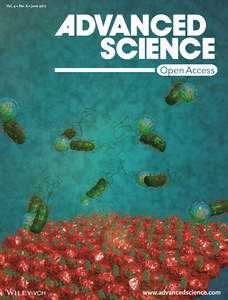Bioadhesive Bacterial Microswimmers for Targeted Drug Delivery in the Urinary and Gastrointestinal Tracts
2017
Article
pi
Bacteria-driven biohybrid microswimmers (bacteriabots), which integrate motile bacterial cells and functional synthetic cargo parts (e.g., microparticles encapsulating drug), are recently studied for targeted drug delivery. However, adhesion of such bacteriabots to the tissues on the site of a disease (which can increase the drug delivery efficiency) is not studied yet. Here, this paper proposes an approach to attach bacteriabots to certain types of epithelial cells (expressing mannose on the membrane), based on the affinity between lectin molecules on the tip of bacterial type I pili and mannose molecules on the epithelial cells. It is shown that the bacteria can anchor their cargo particles to mannose-functionalized surfaces and mannose-expressing cells (ATCC HTB-9) using the lectin–mannose bond. The attachment mechanism is confirmed by comparing the adhesion of bacteriabots fabricated from bacterial strains with or without type I pili to mannose-covered surfaces and cells. The proposed bioadhesive motile system can be further improved by expressing more specific adhesion moieties on the membrane of the bacteria.
| Author(s): | Mostaghaci, Babak and Yasa, Oncay and Zhuang, Jiang and Sitti, Metin |
| Journal: | Advanced Science |
| Volume: | 4 |
| Number (issue): | 6 |
| Pages: | 1700058 |
| Year: | 2017 |
| Department(s): | Physical Intelligence |
| Research Project(s): |
Bacteria-powered biohybrid microswimmers
|
| Bibtex Type: | Article (article) |
| Paper Type: | Journal |
| DOI: | 10.1002/advs.201700058 |
|
BibTex @article{mostaghaci2017bioadhesive,
title = {Bioadhesive Bacterial Microswimmers for Targeted Drug Delivery in the Urinary and Gastrointestinal Tracts},
author = {Mostaghaci, Babak and Yasa, Oncay and Zhuang, Jiang and Sitti, Metin},
journal = {Advanced Science},
volume = {4},
number = {6},
pages = {1700058},
year = {2017},
doi = {10.1002/advs.201700058}
}
|
|




